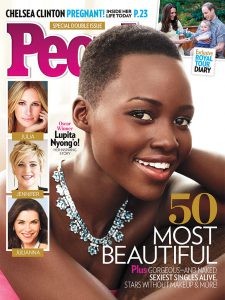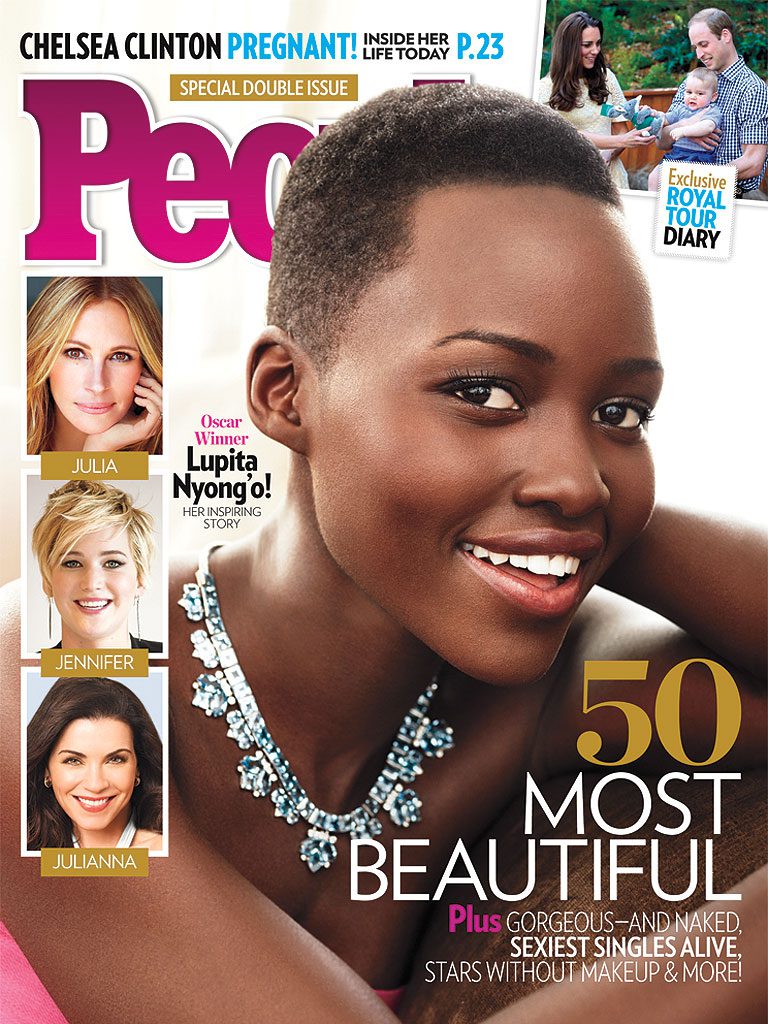by Montgomery Jones
There are so many wonderful things that can be said about Academy Award winner Lupita Nyong’o. She seemingly appeared on the Hollywood scene out of nowhere. Actresses spend years and money trying to reach the success that Lupita has garnered from her performance in 12 Years a Slave as Patsy. Lupita caught the public’s attention for her acting, but she kept our attention when she started speaking about important topics such as skin lightening and Hollywood’s perception of beauty. Her speeches brought me to tears. Her confidence and zest for life were awe-inspiring. There are so many wonderful things that can be said about Ms. Nyong’o, but “Most Beautiful” is probably my least favorite.
Hollywood scene out of nowhere. Actresses spend years and money trying to reach the success that Lupita has garnered from her performance in 12 Years a Slave as Patsy. Lupita caught the public’s attention for her acting, but she kept our attention when she started speaking about important topics such as skin lightening and Hollywood’s perception of beauty. Her speeches brought me to tears. Her confidence and zest for life were awe-inspiring. There are so many wonderful things that can be said about Ms. Nyong’o, but “Most Beautiful” is probably my least favorite.
Don’t get me wrong, she is breathtakingly beautiful, and it was encouraging for many to see someone other than a thin blonde actress (2013) or Beyoncé with her light skin and blonde hair (2012) on the cover of People’s coveted issue. Dark skinned actresses of any ethnicity are hardly ever leading ladies in film or television period, let alone praised in mainstream media for their beauty. When magazines and other media need to fill their “person of color” quota, they usually stick a fair skinned person in the mix, sometimes so fair that they could pass for white. But while people celebrate People Magazine’s ability to acknowledge different kinds of beauty, I can’t help but feel like they’re trying throw us off their scent.
To be completely honest, I feel manipulated. Why are we celebrating a gossip magazine’s ploy to remain relevant? Every year they have stars vying for that cover of “People’s 50 Most Beautiful” or People’s Sexiest Man Alive,” and some may say it’s part of the game but I’m calling shenanigans. How does one even measure beauty? Straight white teeth? Perfectly plucked eyebrows? A flawless and even complexion? Fair skin and long flowing hair? Well not anymore, because People Magazine says Lupita is beautiful so that must be changing, right? Wrong! This is the industry’s way of saying that they’re not racist, that they celebrate all kinds of beauty! And if you call them out on it, they’ll pull out this magazine and say, “look! dark skin and short hair!”
I am not saying Lupita is not beautiful or a talented well-spoken woman. I am saying that this cover does not praise her talent or her heartfelt speeches. As everyone shared the great news that “Lupita’s on the cover” on all social media platforms I thought this is what they (People Magazine) wanted. Sure, People Magazine usually put relevant stars on their “Most Beautiful” list but this was different. Readers were praising the magazine for being diverse and accepting. Most of the comments I saw being shared with the post were phrases like “Wow! What a fantastic time to be a black woman” or “ I’m happy they’re finally acknowledging different kinds of beauty!” The cover of the magazine says “50 Most Beautiful Plus: Gorgeous-and naked Sexiest Singles Alive, Stars without Makeup.” Which in and itself is just plain odd. Emphasis on words like “beautiful” and “gorgeous” as well as “naked” and “sexiest singles.” Let’s not forget the fact that you too can look beautiful without makeup. It’s the hoopla we see time and time again on the cover of magazines. The bolding of key words they think we will instantly be drawn to about beauty, thinness, sexiness. It rings too insincere for my liking.
Are you saying that these are the 50 most beautiful women right now ever in Hollywood? Even if they were the most beautiful women in a neighborhood that would be incorrect, because why? Because beauty is subjective. Hollywood sells us these images of people that they tell us are the most beautiful, the best bodies, and the sexiest men alive! I know that some might say that in defense of the magazine, this is not to be taken literally. It’s fun and silly! But is it silly when people are doing any and everything thing to have the “most beautiful” figure, including developing eating disorders? Is it fun to have people break the bank so they too can have long flowing locks or makeup that covers up all of their “flaws”? No, it’s not. And that’s what this all adds up to.
We can’t fix the crumbling foundations of our self esteem as a whole species if we don’t acknowledge that there is something seriously wrong when people vying to be “most beautiful.” It’s not wrong to want to feel beautiful or have someone tell you that you’re beautiful, but it is wrong when corporations are profiting off of our insecurities, and so the cycle begins all over again. Here are some other really exceptional titles for People Magazine in case they realize how archaic the very idea of “Most Beautiful” really is: how about “Great Entrepreneurs of 2014”? Or “50 Stars Who Helped their Communities”? Or maybe “50 Stars Who Fought Patriarchy!” Okay, the last one is a stretch.
I’m not saying to never celebrate beauty or pretend it’s not there. I’m asking: why do we continuously congratulate the stars for being beautiful when that is in the fact why many of them are stars in the first place? That’s like awarding a flamingo for being pink! The stars will continue to emphasize beauty if they can get that cover even when they are told that they are beautiful 364 other days of the year. It is 2014; we have made exceptional medical advancements, discovered whole new planets, and have laptops as light as a feather. Let’s stop regurgitating the same magazine covers on all publications 52 weeks a year, stop asking the celebrity’s beauty secrets, and be pleasantly surprised when they say “true beauty comes form within,” and for the love of Pete, let us please stop us from rewarding celebrities for being celebrities. In my eyes, Lupita would be awarded “Most Gracious” or “Most Eloquent Speaker.” She is so much more than a pretty face. She is a Yale graduate, an Academy Award winner, and a star who talks about things that are often swept under the rug. I think Lupita would agree with me in saying that we define our beauty, but our beauty does not define who we are.

I have the feeling you would be singing a different tune if Lupita weren’t a dark-skinned woman.
The absolute shade of it all.
Wellllll… This is People Magazine you are talking about, after all– a vapid gossip rag. They will never change their formulation. The only way for us to get our point across is to boycott. I refuse to purchase the filth and instead choose to spend my money on magazines like Ms. and Bitch. When their sales decrease, only then will they rethink their material.